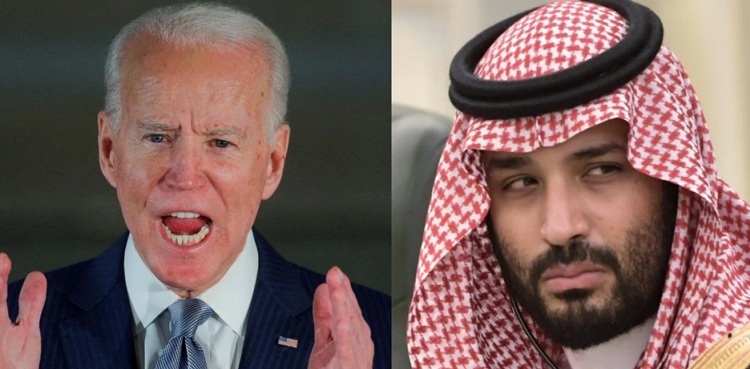Shift In U.S. Policy Toward Saudi Arabia: A Hope Against Islamism?

United States intelligence agencies concluded that Jamal Khashoggi was killed by a Saudi hit squad operating under the command of Saudi Crown Prince Mohammed bin Salman (MBS) — Saudi Arabia’s de facto ruler played.
In an unclassified U.S. intelligence report, held back by former President Donald Trump, despite a 2019 law passed by Congress requiring its release, confirmed for the first time what the CIA always held.
In a November 2018 CIA investigation it was determined that crown prince Mohammad bin Salman (MBS) — the kingdom’s de facto ruler — ordered the killing. This conclusion was backed up by Agnes Callamard, the UN’s special rapporteur on extrajudicial, summary or arbitrary executions, who found “credible evidence” that MBS and other senior Saudi officials were liable for the killing in an investigative report published in June 2019.
Trump, despite initially being lied to by Saudi officials, thereafter saying he was “extremely angry and very unhappy” about the Khashoggi murder, indicated that the benefits of good relations with the kingdom, specifically the selling of arms, outweigh the possibility its crown prince ordered the killing. Trump had also approved six authorizations for U.S. companies to conduct nuclear-related work with Saudi Arabia.
At that time, the staunch Trump supporter Senator Lindsey Graham said: “You have to be wilfully blind not to come to the conclusion that this was orchestrated and organized by people under the command of MBS.”
New Measures Under Biden
U.S. officials factored in MBS’ past support for using violent measures to silence dissidents abroad, the report said. Consequently, the U.S. State Department responded by announcing visa restrictions on 76 Saudi individuals involved in threatening dissidents abroad.
“As a matter of safety for all within our borders, perpetrators targeting perceived dissidents on behalf of any foreign government should not be permitted to reach American soil,” said Secretary of State Antony Blinken.
President Joe Biden held a long-delayed first phone call Thursday with Saudi King Salman ahead of an imminent aforementioned report — Biden kept the king waiting in his long list of calls to American allies after being sworn in five weeks ago.
And when he did finally reach out to the Saudis, it was pointedly to the king and not the expected successor, MBS. In other words, President Biden is returning to “counterpart to counterpart,” meaning he plans to discuss U.S-Saudi issues with King Saudi and not MBS.
Shift in Policy in Yemen
The new administration has taken steps to shift Washington’s relationship with Riyadh, including a push to end the genocidal civil war in Yemen:
- Biden on February 4 announced he would terminate military support for a Saudi-led military campaign in Yemen blamed for targeting civilians and causing a humanitarian crisis — Trump, notwithstanding the bipartisan majorities in both houses of Congress passing legislation in 2019 to block or limit U.S. weapons sales to Saudi Arabia and the UAE used an emergency declaration to finalize a deal that would sell $8.1 billion in armaments to the three countries.
- He named US diplomat Timothy Lenderking as a special envoy for the Yemen conflict and signalled his administration would reverse Trump’s designation of the Iranian-aligned Houthis as a terrorist group.
- Biden has also imposed a temporary freeze on sales of F-35 advanced fighter jets to the United Arab Emirates (UAE) and precision guided munitions to Saudi Arabia pending a review.
Addressing Human Rights Violations
Biden also raised the issue of human rights when he spoke to Saudi King Salman. In their conversation, President Biden ‘affirmed the importance the U.S. places on universal human rights and the rule of law.
It must be remembered that the kingdom’s human rights violations is deplorable, to say the least. The is systematically due to its observance of Wahhabi tenets — Wahhabism is described as the most draconian and sectarian observation of Islam — which also include forced marriages of prepubescent and teenage girls to adult men, having boys as sex slaves, slavery and human trafficking, including that of children, the exploitation of women as property and the death penalty for Muslims who leave Islam or convert to another religion.
While the Biden administration’s shift in policy is significant, it must nevertheless be followed up. The Saudis need to halt its suppression of pro-democracy activists, peaceful public assembly, religious freedom — there are no churches or synagogues in Saudi Arabia — and its restrictive male guardianship laws.
Saudi women’s rights activist Loujain al-Hathloul, who anchored the movement against such repressive norms was released from prison earlier this month after serving 1001 days. Loujain, however, is by no means free. She is banned from traveling for five years and remains on a three-year probation, living under the constant threat of being jailed again.
The Biden administration, which says it wants to “recalibrate” its relationship with Saudi Arabia, has a moral obligation to temper the sadistic abuses and lewd military conflicts carried out by MBS that have only destabilized the Middle East. That being said, the fact that the Saudis will no longer have use of American weapons to carry out their now six-year-genocidal war in Yemen and that MBS will apparently no longer have any input on how the U.S. will exercise its affairs with the Saudis is already a sign of hope that the fight against the most draconian form of Islam can be stopped.
__________________________________________________

Mario Alexis Portella is a priest of the Cathedral of Santa Maria del Fiore and Chancellor of the Archdiocese of Florence, Italy. He has a doctorate in canon law and civil law from the Pontifical Lateran University in Rome; he also holds a M. A. in Medieval History from Fordham University, as well as a B.A. in Government & Politics from St. John’s University. He is also author of Islam: Religion of Peace? – The Violation of Natural Rights and Western Cover-Up.

Book available on Amazon, Barnes & Noble or WestBow Press.





Recent Comments